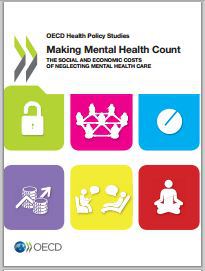 Former US President, Harry Truman, once said: “It’s a recession when your neighbour loses his job; it’s a depression when you lose yours.” This rings particularly true right now, when in some countries it might not just be your neighbour but your whole street, you included, that has lost their job. In fact, being unemployed has a large negative effect on your physical and mental health, as well as on how happy you are with your life.
Former US President, Harry Truman, once said: “It’s a recession when your neighbour loses his job; it’s a depression when you lose yours.” This rings particularly true right now, when in some countries it might not just be your neighbour but your whole street, you included, that has lost their job. In fact, being unemployed has a large negative effect on your physical and mental health, as well as on how happy you are with your life.
There have been many indications that rates of anxiety and depression have been rising since the economic crisis. Europeans reported feeling “more negative” in 2010 than in 2005-06, and one study even linked the rise in suicides to the 2008 downturn, with nearly 5000 suicides above the expected level in the following year. This has severe consequences on the population’s well-being, with mental health being a key determinant of how healthy people are and how satisfied they are with their life. For instance, over the four years to 2012, average life satisfaction declined by more than 20% in Greece and by around 12% in Italy and 10% in Spain, all countries that experienced big rises in unemployment. Looking at the OECD Better Life Index, we see that these three countries now all do poorly in life satisfaction, with Greece coming last.
The OECD’s Making Mental Health Count tells us that mental health has a huge impact on economic productivity. Not only are people with severe mental illness more likely to die younger (up to 20 years), but they are more likely to be unemployed and poor. This translates into very high costs for countries, with the total costs – direct and indirect – of mental ill-health reaching an estimated $2493 billion in 2010. In England, the overall lost earnings due to depression were estimated at £5.8 billion in 2007, and is projected to rise to £6.3 billion by 2026. Being mentally healthy is defined by the World Health Organization (WHO) as “a state of well-being in which the individual realises his or her abilities, can cope with the normal stresses of life, can work productively and fruitfully, and is able to make a contribution to his or her community.” But if you don’t have a job and you’ve more chance of being depressed, and if you are depressed you probably don’t have job. So what’s the solution?
Unfortunately, despite the enormous health, social and economic costs created by mental illness, mental health care is still not a priority in most countries. Although there has been an initiative by many countries to move people out of mental hospitals towards care in the community, which is better, there is still plenty of room for improvement. The amount of money spent on mental health care is very small. For example, mental illness is responsible for 23% of England’s total burden of disease, but only receives 13% of National Health Service health expenditures. This low spending is mainly due to lack of information on the amount of care provided and the outcomes care produces. This is because mental health problems are completely different from physical problems, and much harder to understand and measure.
This is a big issue for the well-being of countries, as around 20% of the working-age population suffers from a mental disorder. Being mentally unwell has a major impact on your quality of life, and your ability to be productive at work. Conversely, work organisation and workplace relationships can have a profound effect on your well-being and mental health. So much so, that one of Britain’s leading doctors, John Ashton, has called for the country to switch to a four-day week to reduce high levels of work-related stress, let people spend more time with their families or exercising, and reduce unemployment.
Fortunately, there are initiatives which are trying to shine a light on this hidden issue and improve the services provided in the workplace for mental health problems. One example is the prevention and reintegration services offered by Helsana, the largest private health insurer in Switzerland. They offer companies support to develop a healthy work environment through the assessments of risk factors (including factors that can generate mental health problems) and the development of a prevention plan, as well as helping sick employees return to work. However, despite these initiatives, much more must be done.
In the meantime, if this article has made you depressed, try taking a leaf out of Edgar Allan Poe’s book, when he says: “I do not suffer from insanity, I enjoy every minute of it”.
Useful links
How’s life? 2013 – Measuring well-being
Mental health and work This series of country reports offers both a general overview of the main challenges and barriers to better integrating people with mental illness in the world of work, as well as a close look at the situation in specific OECD countries.
